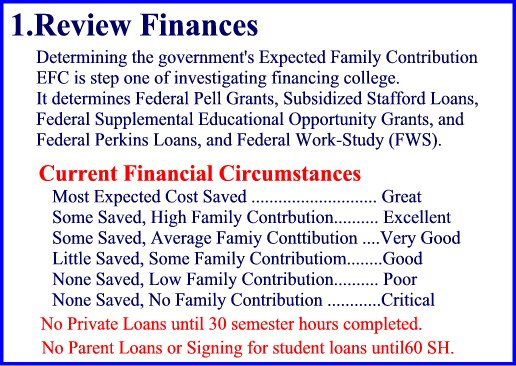|
Choosing a College and Major
|
|||
 |
|
 |
|
|
|
 1 p1 page printing 1 page color printing |
||
| Choosing a College
1)
I have been accepted at a good school and am afraid I can't do the
work. Answer: Unless you have excellent
academic ability as indicated by the previous chart you should try to attend a school in
which you are in the middle half of the freshman class. For most students college is more than an academic experience and competing against students that are
much stronger academically will lower grades and deprive you of many nonacademic experiences. While standardized test are not a good predictor of
success as measured by graduation, they do well predicting academic and career success. If your SAT is 1000 and the average at
your good school is
1,100 then you may graduate but your grades and non-academic experiences may be
low. 3 How can I maximize college financial aid.
Answer:
Colleges compete for students and
award financial aid accordingly. They start with your Expected Family
Contribution. Students with high standardized tests scores are
sought after. If relative to other freshman applicants your scores are
high you receive more aid. Students with a desired skill be it the Arts,
Sports, etc. receive more aid. If you have high relative scores or
skills a private school close to home may be less expensive after
financial aid than an inexpensive live-in
public school. See
Financial
Aid
See A Compelling Argument For Ivy League Obsession Falls Flat Students Personal Finance |
|
Choosing a Major 1) Do I have to choose a major right away? Answer: Probably not. Many schools will ask you to
declare
a major after a year or two.
Answer: Most students change majors or end up working in a career field unrelated to their major. That said, attend Department A of State U, work hard to maximize your cumulative grade point average, and apply for a change of major to Department B. A high paying STEM major may be worth the effort but be prepared to work very hard. See Not All College Majors Are Created Equal. 3) Why is a major important Answer: 1) You should major in something you like to do, rather than something you like to study. You may like to study psychology, but do you want to get a master's degree and be a school psychologist. or work in social services. 2) If economics return is important then major is important. At the very least choose a high demand minor. The vast majority of job openings will be in health care, education, business, and high paying STEM areas. Science, Technology, Engineering and Mathematics pay the most. There are fewer really good paying jobs in liberal arts and social sciences. See Not All College Majors Are Created Equal and The Myth of the Well- Rounded Student 3) New study shows careers and college majors often don't match 4) Are there steps I should follow in choosing a major? Answer: 1) Choosing a Career 2) Matching Careers to Degrees See Employment Data on College Majors Business Insider 2014
Return to
textbooksfree.org/Professor A's Advice for Students and Parents |
|
College Access is About Guidance as well as Money
See A Compelling Argument For Ivy League Obsession Falls Flat |
 |
Average starting salaries according to
|
|||||||||||||||||||||||||||||||||
 |
 |
||||||||||||||||||||||||||||||||||




